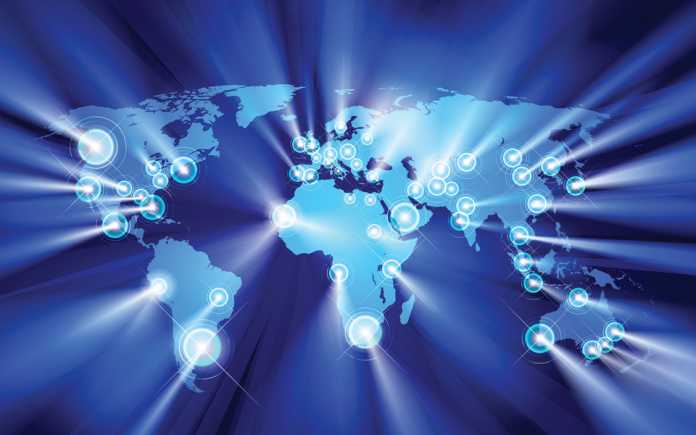Global society is increasingly expressing itself through globally identifiable institutions of civil society. In this article, Winston Nagan explores the inter-relationship of sovereignty, the Rule of Law, and individual identity in the scheme of evolving global governance and considers the Rule of Law and its potential for global constitutional development.
Global Rule of Law: Paradigm Shift
The Rule of Law is a disarming phrase. It suggests simplicity but is related to the complexity of sovereignty. I suggest that the Rule of Law idea was largely an idea generated by legal culture to limit the arbitrary capacity of sovereign decision-making. Shapiro, a student of totalitarian political culture suggested that the fundamental difference between totalitarianism and democracy was a working Rule of Law: a restraint on arbitrary sovereign action.
The Rule of Law is reflected in the evolution of modern constitutional democracy. It is the Constitution as law, which limits sovereign absolutism. After WWII, ‘we the people’ of the planet promulgated a global constitution. This constitution and the processes that preceded it is the United Nations Charter. What is distinctive about the Charter is it did not seek to establish itself as a neutral umpire between the competing stakeholders. It is not value free. It is rooted in the fundamental values that humanity has identified for its survival and future prosperity. This implicates a Rule of Law of global dimensions, rooted in the fundamental values of human coexistence and aspiration, as well in the promise of a constitutional culture, which seeks to give specific prescription and application in concrete instances of decision responsibility. Scholars suggest there is a need for a new paradigm for the global Rule of Law. In these inquiries, a new paradigm implicates global constitutional law and a global interest in good governance at every level of society; it must present a developmental vision of a realisable and more promising future.
What is meant by the Global Rule of Law?
The UN General Assembly has on occasion, attempted to clarify the meaning of the Rule of Law. However, these efforts resemble a laundry list of issues that invite immense complexity. To illustrate, the UN demands a most inclusive list of participators including inter-governmental entities, sovereigns, and individuals. They stress the importance of predictability, legitimacy, accountability and the importance of just, fair and equitable laws. They also suggest an economic dimension, which ties in with sustainability, economic growth, development, and poverty eradication. I suggest that a shorter and clearer statement may be given. The terms Rule of Law symbolise an inspiration about basic values and seek to guide authoritative and controlling decision-making (for which we reserve the term law) to secure the objective of all law: to defend and promote the common interest of all the people. The common interest today is seen in universal wellbeing and a celebration of human dignity. The symbol Rule of Law implies an aspirational future of realisable global justice and dignity. This implicates the vision of a desired developmental future for humankind. That in short is the challenge symbolised by the global Rule of Law idea. The central institutional mechanism, which gives the Rule of Law idea operational relevance, is the constitutional form that it inspires.
Broadening the Authority Foundations of the Global Rule of Law
From a global perspective, it is appropriate to identify a global constitutional process. That process includes the text and practice of international society under the UN Nations Charter. However, it is by no means clear that the UN Charter (our global constitution), has universal traction among all stakeholders, or is a constitution with fully enforceable international obligations as law. The weakness of the Charter as a global constitution is that it has to contend with the concentration of effective power among key sovereign state participators. It is apparent that a directorate of super sovereign states drives key decisions of the UN. In short, the practice has gravitated to a high level of sovereign state influence as well as the advantage of control that such entities generate. This suggests that the control factor, a residue of sovereign abolitionism, seriously weakens the authority foundations of the global constitution. Unrestrained sovereign claims to absolutism led to the demise of the League of Nations. It was for this reason that the drafters of the Charter confronted the problem of authority behind it. The very first terms, which introduce the UN Charter, locate its authority in a statement, which says, ‘We the people…determine’. The Preamble in Chapter 1 identifies peoples and individual rights in terms of the need for security, human rights and dignity, humanitarianism, economic and social justice, and respect for law. Most of the rest of the document deals with the membership of states and the powers allocated to them.
The challenge humanity faces is how to broaden the authority foundations of the global Rule of Law. It should be stressed that at any level of society, key problems emerge from the human participators and it is those problems that require law to respond in the form of responsible authoritative and controlling decision-making. The first task is to provide some insight into the nature of global authority and global problems in order to understand that there is such a thing as a global or planetary community.
What is of critical normative salience is that however humanity is organised institutionally, at the back of every institution are the human agents who claim identity, who assert claims for basic values and who also demand the recognition of settled expectations. Important insights recognise the individual as a fundamental unit of legal and political analysis in the global environment as reflected in the text of the UN Charter, especially the human rights references and subsequent developments in the area of human rights, humanitarianism, and development. We may connect this to the notion of an evolving or emerging paradigm of inclusive global governance. We can identify the prior paradigm as the largely territorially organised sovereign state paradigm. This paradigm is challenged by the creation of other participatory stakeholders in the global social, power, and constitutional processes. These other stakeholders include not only intergovernmental organisations, and multi-national corporations, but include humanity as a whole. Global society is increasingly expressing itself through globally identifiable institutions of civil society. This is a fact increasingly recognised by the UN itself.
Commentators draw attention to the failures in global economic development and see as a missing component of a solution to our current economic crisis the importance of human capital as a driving force of social capital. The central insight here is that individual human beings represent capital resources, which if properly developed, generate social capital, of relevance to economic organisation.
Creating Space for the Global Community
The critical question for the UN and other enlightened participators is how to create more space, politically, culturally and economically for the individual subjects of the global community process. I suggest that this is a matter of importance because this universe of participators would deeply strengthen the authority aspect of the global constitution. Involvement as stakeholders may well change the global expectations, which limit the UN’s authority because of a few super sovereign states.
At present, the world is permeated by the emergence of many sectors of global civil society. Recently we saw the emergence of the Earth Summit in Rio, the Cairo World Population Conference and the World Conference on Women in Beijing. The global campaign for climate action (GCCA) is an alliance of 300 non-profit organisations around the world whose objective is to mobilise civil society and galvanise public support for a safe climate future. The GCCA led a campaign against the XL pipeline. They also led the push for European leaders to support a financial transaction tax for the purpose or grappling with poverty and climate change.
We should also note that the World Association of Non-Governmental Organisations website lists some 22,885 NGOs in North America alone. Global society is also permeated with professional organisations in law and medicine, the sciences, and the arts. Our central problem is to modify the UN Charter or creatively interpret it to promote non-state actors access to this important forum of international decision-making. This will require complex strategic thinking but at the back of this approach, there must be the realisation that expanding civil society participation and influence also broadens the authority foundations of the UN itself. A mobilisation of the professions, the civil society organisations, and the humanitarian and human rights NGOs could provide a form of advantage where the UN can confront the crunch issues looming on the horizon.
A Global Social Process
A realistic understanding of the Rule of Law and its potentials for improving the human prospect must be rooted in the social reality of a global social process. Sovereignty holds a crucial position in the context of global, social, political, and juridical context. In the current global social process, we witness a very wide range of non-state, non-sovereign actors. The emergence and salience of these actors has served to limit in some degree the centrality of sovereignty in the global scheme of governance, and has been facilitated by the global communications revolution. This revolution permits the emergence of newer forums outside of the boundaries of sovereignty and is described as global civil society.
A new paradigm of the Rule of Law has witnessed an evolutionary trend in the development of sovereignty and its placement within the context of the fluid notion of globalisation. This development presses us to explore more critically the conceptual and normative bases of sovereignty in our time and to appraise it in terms of the notion of authority in the idea of governance itself. In general, authority is rooted in the people’s expectations and therefore the idea of authority itself resists the notion that it be collapsed into a form of sovereignty, which implies the monopolisation of power and at the same time diminishes the popular expectation of authority rooted in the people.
The UN Charter limits membership to sovereign nation states. However, the Charter proclaims that it communicates with the authority of the people of the planet. Indeed, the normative foundations of the Charter are rooted in the people’s expectations of peace, security, human rights, and social progress. This represents an important challenge to the Rule of Law, that this idea finds its authority in the people of the world community. The recognition of the importance of the people as a source of authority for a new paradigm of the Rule of Law is a critical shift of focus. It might challenge the idea that the values relating to the very existence of humanity are to be monopolised by a small directorate of powerful states whose foundations in the authority of people’s expectations is limited.
A New Paradigm for the Rule of Law: A Glimpse of Future Developmental Constructs
Not only could the global Rule of Law idea partake in the generation of global developmental constructs for the improvement of the human prospect, but theorists such as James Martin stress some other dimensions of problems of global importance. Reference is made to the crisis of climate change, demographics and over population, the shift of global economic power to the corporate form of economic organisation, and the possibility of future pandemics of global destructive capacity. A Rule of Law that gives full recognition to the individual in the global environment may have a positive influence on how such future challenges are confronted. An unadulterated recognition of the individual is recognition of the human capital inherent in all human beings. This would seem to tie in the idea of human capital and its importance for a global development construct. One aspect of this should be whether human capital and global development may be indicators of human happiness. Indeed, if we consider the inevitability of technological innovation and its impact on economic productivity, we may well have to confront the challenge that a newer paradigm of development may require a sharing of the benefits of technological innovation. Sharing may implicate the prospect of more leisure time for humanity, and may enable conditions to favor an opportunity for a renaissance in human affairs in which human capital is highly valued for its imaginative, co-creative capacity.
This human potential facilitates in an unleashing of innovation and creativity as a form of aesthetic development. Within the new Rule of Law paradigm, aesthetics may constitute one of the most fundamental of human rights. A very reasonable developmental construct for a new Rule of Law paradigm provides the normative guidance at an inclusive global level which functions as a liberating force for human creative possibility. This is directed at individual creative capacity, hopefully as a humane and socially liberating force that gives voice and is rooted in the expression in global civil society in which individuals are both the controllers and the controlled.
This perspective, idealistic as its sounds, is rooted in important contemporary social fact. It has a fit for the common understanding of the Rule of Law. A central value objective of the UN Charter focuses on the well being and dignity of the individual. Inherent in the constitutional foundations of the Charter is an appreciation of the close link with its fundamental base of authority: we the people. This base of authority is global in its potential reach. Current practices encourage engagement in civil society and the constitutional system needs to find the means and the methods to open up its processes to civil society. This may mean a significant transformation of the doctrine of sovereignty away from coercion and immersed rather in the authority of the people. In mobilising the authority of the people, tremendous potentials reside in the modern communications revolution. This revolution may be a vehicle for a new order of a global renaissance.
We may generate other developmental constructs such as a world free of nuclear weapons, in which war is abolished, and which need is globally secured for all. A world in which educational values are defended and promoted, which seeks to maximise universal respect, and which makes the giving and receiving of affection a major expectation of interpersonal as well as cultural aspiration. If affection is given its due, humanity will have a profound basis for global solidarity because affection and empathy are the essential ingredients of solidarity on a global scale.
It seems clear that the domination of global governance by territorially organised sovereign states cannot solve the great global problems of our time, which threaten the survival of all. New initiatives based on new thinking are urgently needed and organisations like the World Academy of Art and Science, the Club of Rome, and such academic innovations as the Oxford Martin School, are an indicator that there is an incipient move to develop a new paradigm for a new age.
I conclude with a warning about the consequences for humanity of a weakened global Rule of Law. This warning I discovered in the papers of my late wife, Judith Nagan who passed April 5 this year. She saw in the demise of the global Rule of Law a real threat to humanity. These are her last words: ‘I fear for mankind’s survival. I believe we will most likely destroy life on this planet in the not too distant future. With so much suffering that man creates, it seems almost inevitable. Nuclear destruction is how we will end. Quickly. But life will begin again of course – and it will all start all over again – and we will have learned nothing’.1
About the Author
Winston P. Nagan is Sam T. Dell Research Scholar Professor of Law, University of Florida and Director, Institute for Human Rights, Peace and Development. He is a Fellow and Trustee of the World Academy of Art & Science and Editor-in-Chief of its electronic journal, Eruditio. Professor Nagan is also a Fellow of the Royal Society of the Arts and has served as Chair of the Board of Amnesty International, USA. He is widely published in the area of international law and the use of force, as well as in law and development and human rights. His most recent book is Contextual-Configurative Jurisprudence: The Law, Science and Policies of Human Dignity (2013).
Reference
1. From the papers of Judith Mattox Nagan (1944-2013)
































































